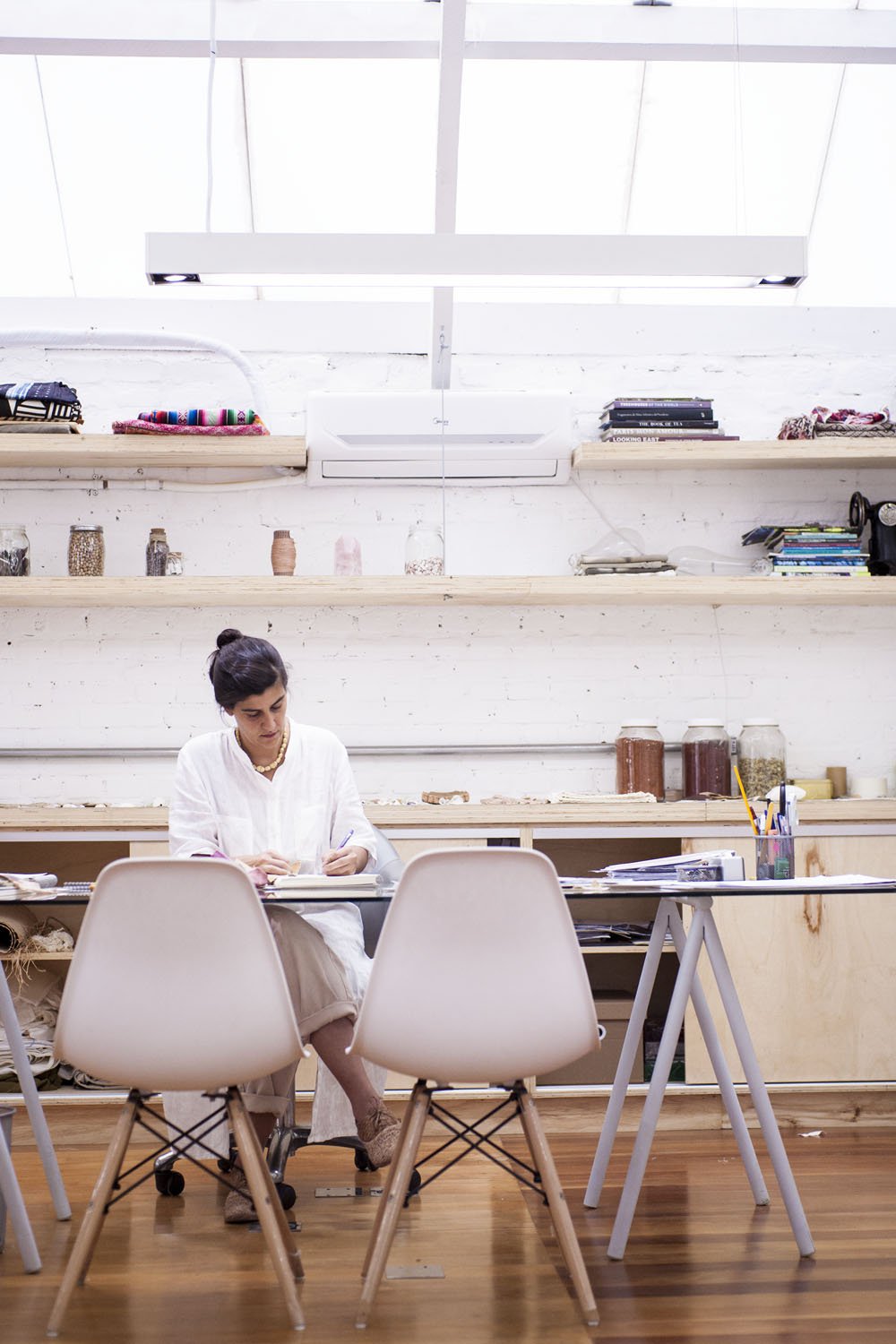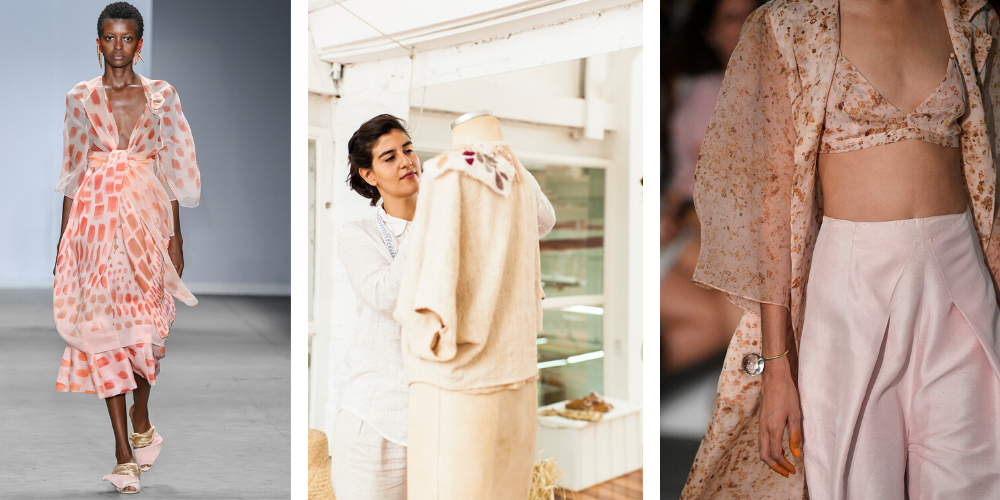SUSTAINABILITY FROM BRAZIL
Designers
Meet Flavia Aranha, the eponymous label offers high-quality pieces made with natural dyes.
Founded in 2011 by the Brazilian designer Flavia Aranha, the eponymous label offers high-quality pieces made with natural dyes. The designer has spoken with us about her label, her inspirations and her difficulties she has faced maintaining a sustainable brand in 2019.
Can you tell us about your professional history?
I founded my sustainable brand after having worked in the mainstream fashion industry in Brazil. For the first part of my career, I worked for the “traditional” industry in China and India, where I witnessed horrific working conditions and environmental disarray. I re-evaluated my values and decided to dedicate my life to creating good for society and the world as a whole, so I quit my job and travelled to Brazil to learn more about nature and the incredible knowledge of arts and crafts. I wanted to prove to the industry that I could run my business (opening my shop and studio) in an ethical manner, having a positive impact: creating sustainable fashion that really works! I travelled all over the world to research and work with natural dyes and organic fabrics. I have big chain suppliers: I deal with small farmers who produce eco-friendly and organic plants, such as cotton and silk. Sustainability is not a style, I think every company should uphold these values.

How did you get involved in sustainable fashion?
Travel and experience are really important: that’s what touched me, that’s when you change your mind. When I went to China and saw other people suffering in conditions I would never accept, it was a really strange feeling. I had one aim: to find my company a polo shirt for $2.99, I found it, and so I got promote. That was the turning point for me. Now, all of our clothes have a QR code that comes with a video explaining how they were made, in order to raise awareness and change consumption patterns. My company is all about education: starting from the suppliers to the consumers. If we don’t change society, the world will be in danger.
Can you describe your brand in 3 words?
Regenerating
Beauty (open-minded)
Collaboration
Can business truly be ethical?
This is a good question! Capitalism will never be sustainable due to social difference : if you concentrate the capital in one area, you can never be sustainable, you need to be equalitarian… Sustainable business is one way to build a new economic system : we are part of a change, that will take time but we are getting there, it’s a process. In Brazil, my brand is a reference for young people: they now understand that yes, it is possible to make it right ! We aren’t big company, I’m not rich, but we are growing!
What are your inspirations?
The process itself inspires me, I dye things myself, I get stuck in, I make the colours first and I choose the materials. Seeing the silk dancing in the boiling water and the light shining through it really inspires me. I see the poetry in the process. Also, nature inspires me and teaches me a lot about the business model I have built, such as how plants survive and live together. I really enjoy travelling to see different ways of living, that mix simplicity and sophistication which is reflected in my work.
Why IMPACT?
We opened a shop in Lisbon last year, so we started selling to the European market and our best clients are in the South of France, so we decided to go to France and take part in Impact, the new trade-show! We have to be careful of greenwashing, in order to make it work. We need to move forward, it’s better to go step by step, than no step at all!
On the consumer side of things, what noteworthy changes have you noticed?
We have good clients who are concerned with sustainability: they eat organically and use organic cosmetics, they are really committed to changing their habits. However, I also sell to people who do not care at all! The most interesting thing is when people buy pieces because they’re beautiful and then after listening to the story behind them, start changing little things in their lives. For example, we have a partnership with an organic soap brand, so that consumers can wash their clothes with non-petroleum soap, to stay in line with our initiative. We also never sell anything in plastic: we have used organic ever since our first collection, so consumers can see it is possible to live without plastic. So that they buy less and better, and wear their clothes for 10 years or more!

What challenges do you face daily?
The hardest thing for us to do in Brazil is investing in technology because we have to combine ancestral traditions with technology. Another difficulty is our President, and the way he deals with the forest fires in the Amazon, we’re in trouble there. I think nowadays, political resistance can involve fashion, showing that we can make our economy grow whilst still preserving nature. The actual government is not supporting sustainability, innovation or technology.
What do you see for the future of fashion?
People say fashion is dead, but that’s like saying “desire is dead,” which isn’t true! We need to create and consume, buy new things, express ourselves, desire: so fashion is in fact very much alive. Fashion is about having the freedom to express your style, ideas and creativity. When I create my collections, I’m designing for a new and better world! I hope fashion is starting to become more democratic, free to explore new aesthetics, shapes and styles, different bodies and skin colours. I hope the market starts to commit to high quality and better manufacturing, it’s a big deal because fast fashion is only getting bigger. We have to create a new economic system in this world...
Most memorable encounter and your favourite thing at Impact?
I met lovely people: students, clients and people who wanted to build a new business in sustainable fashion/ethical shopping. But also some people who did not care, just simply loved our style. I think this event is very interesting, as many cultures are seen to mix with one another.
What projects are you working on ? What do you have planned for the future of your brand?
Because of the political situation in Brazil, I want to grow my business in Europe, it’s important to expand my concept and improve the support of craftsmen and communities, which I already do. I also want to keep researching and developing a new fibre, much like linen, from a native Brazilian plant.